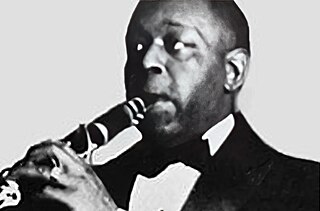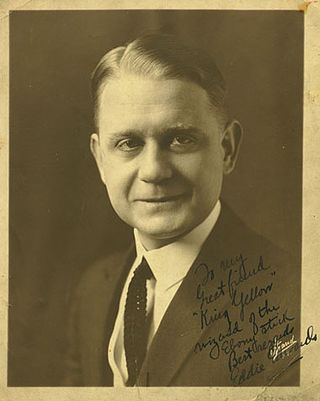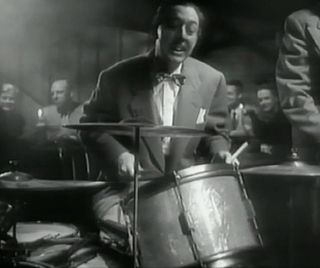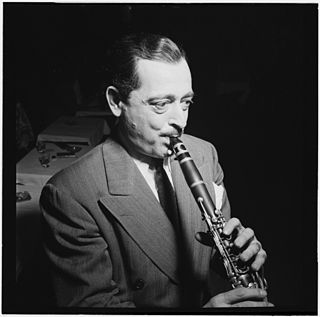Related Research Articles

Joseph Nathan "King" Oliver was an American jazz cornet player and bandleader. He was particularly recognized for his playing style and his pioneering use of mutes in jazz. Also a notable composer, he wrote many tunes still played today, including "Dippermouth Blues", "Sweet Like This", "Canal Street Blues", and "Doctor Jazz". He was the mentor and teacher of Louis Armstrong. His influence was such that Armstrong claimed, "if it had not been for Joe Oliver, Jazz would not be what it is today."

The Original Dixieland Jass Band (ODJB) was a Dixieland jazz band that made the first jazz recordings in early 1917. Their "Livery Stable Blues" became the first jazz record ever issued. The group composed and recorded many jazz standards, the most famous being "Tiger Rag". In late 1917, the spelling of the band's name was changed to Original Dixieland Jazz Band.

Edward "Kid" Ory was an American jazz composer, trombonist and bandleader. One of the early users of the glissando technique, he helped establish it as a central element of New Orleans jazz.

Johnny Dodds was an American jazz clarinetist and alto saxophonist based in New Orleans, best known for his recordings under his own name and with bands such as those of Joe "King" Oliver, Jelly Roll Morton, Lovie Austin and Louis Armstrong. Dodds was the older brother of drummer Warren "Baby" Dodds, one of the first important jazz drummers. They worked together in the New Orleans Bootblacks in 1926. Dodds is an important figure in jazz history. He was the premier clarinetist of his era and, in recognition of his artistic contributions, he was posthumously inducted into the Jazz Hall of Fame. He has been described as "a prime architect in the creation of the Jazz Age."

Barnett, Kyle (2020). Record cultures: the transformation of the U.S. recording industry. Ann Arbor, [Michigan]: University of Michigan Press. p. 42. ISBN 978-0-472-12431-2.

Emmett Louis Hardy was an American jazz cornet player during the early 1900s.

George Clarence Brunies, a.k.a.Georg Brunis, was an American jazz trombonist, who was part of the dixieland revival. He was known as "The King of the Tailgate Trombone".

Edwin Branford Edwards was an early jazz trombonist who was a member of the Original Dixieland Jass Band.

Tom P. Brown, sometimes known by the nickname Red Brown, was an American dixieland jazz trombonist. He also played string bass professionally.

New Orleans Records was an American record label based in New Orleans, Louisiana and active from 1949 until the early 1980s. Originally founded by Orin Blackstone in 1949, it was revived by Clive Wilson in 1972. The label specialized in New Orleans jazz.
Mel Stitzel was a German-born pianist best known for his work with the New Orleans Rhythm Kings, a leading jazz band of the early 1920s. The leading members of the group including cornetist Paul Mares, trombonist George Brunies and clarinet player Leon Roppolo were school friends from New Orleans who recruited others such as Stitzel and drummer Gene Krupa to join their band. Stitzel also played with The Bucktown Five in the early 1920s.

Ray Bauduc was an American jazz drummer best known for his work with the Bob Crosby Orchestra and their band-within-a-band, the Bobcats, between 1935 and 1942. He is also known for his shared composition of "Big Noise from Winnetka," a jazz standard.

Johnny Wiggs was a jazz musician and band leader.
Joseph Hilton "Nappy" Lamare was an American jazz banjoist, guitarist, and vocalist.

Tony Parenti was an American jazz clarinetist and saxophonist born in New Orleans, Louisiana, United States. After starting his musical career in New Orleans, he had a successful career in music in New York City for decades.
Charles "Charlie" Hartmann was a New Orleans jazz trombonist.
The Red Hot Peppers were a recording jazz band led by Jelly Roll Morton from 1926–1930. They were a seven- or eight-piece band formed in Chicago which recorded for Victor and featured some of the best New Orleans-style freelance musicians available, including cornetist George Mitchell, trombonist Kid Ory, clarinetists Omer Simeon and Johnny Dodds, banjoists Johnny St. Cyr and Bud Scott, double bass player John Lindsay, and drummers Andrew Hilaire and Baby Dodds.

Leon "Leo" Adde was an American jazz drummer.
Sidney Arnandan or Arnondrin or Arnondin, better known as Sidney Arodin was an American jazz clarinetist and songwriter, best known for co-writing the pop standard "Lazy River" with Hoagy Carmichael.

The New Orleans Owls were an early jazz band from New Orleans that descended from The Invincibles String band and recorded 23 sides for Columbia from 1925 to 1927 on 78 rpm phonograph record. They are reportedly the first group to record by the electric system operating from a mobile recording van. They played principally for the dancers in the ballroom of the Roosevelt Hotel in New Orleans. The replaced Abbie Brunies' Halfway House Orchestra at the Halfway House dancehall in the late 1920s.
References
- New Orleans Jazz, A Family Album, Rose & Souchon, LSU Press, 1984
- Who's Who of Jazz, John Chilton, Da Capo, 1985